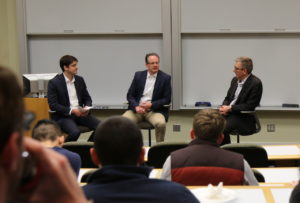By Kara Sherrer
Last week, the Owen Finance hosted two investment experts for a panel: Anders Hall, Vice Chancellor for Investment at Vanderbilt University and Michael Brakebill, Chief Investment Officer of Tennessee Consolidated Retirement Systems. The discussion was moderated by student Josh Schutzman (MBA’18).
Hall and Brakebill discussed a variety of topics, from passive vs. active investing to market volatility to cryptocurrencies. We’ve excerpted portions of their discussion below:
Is passive vs. active investing a cyclical trend?

Schutzman (left) moderates the discussion between Brakebill (middle) and Hall (right)
Brakebill: “To me, active vs. passive is just a tool in a toolbox. I don’t really care…there should be a high bar as far as justifying active management because of the lack of success across the board.”
Hall: “I fundamentally believe the markets are inefficient, and that if you find the right partners you can exploit those inefficiencies. That hasn’t been the case the last couple of years…(but) if February is any indication, I think it’s a great time to be in active management. I think the cycle’s ready to turn.”
Do you feel like the recent volatility is a reversion back to the mean of normal market conditions, or do you feel like this is potentially the end of the road?
Hall: “I would say there is a mean reversion element to it…All that I know for certain is that when it does come to an end, it’s going to come to an end for a reason that is not on people’s radars.”
Brakebill: “Coming out of the election last year, I thought there would be a lot more concern about volatility…I was stunned by how low volatility was.”
Hall: “The markets just don’t seem to care.”
Any specific metrics that they emphasize over others to get a sense of where we are in the markets?
Hall: “Looking at valuation metrics is a really difficult tool for timing where we are in markets. Every metric across every asset class…shows that things are inflated. I was looking at some data that shows this is the second longest bull market we’ve seen since the once that started in 1987….what’s going to cause this to come to an end, I have no idea. I think maintaining a geographically diverse portfolio, diversifying across asset classes, partnering with the best managers that you can find — that’s the best protection you can have.”
Brakebill: “The one thing (trying to forecast the market) shows you more than anything else is how humble you should be. You just don’t have a clue….The Federal Reserve is slowly pulling back. They’re going to do it as gently as possible so they don’t upset anything…it feels more late cycle here than early, so we think we’re closing to the end than the beginning.”
Maintaining a geographically diverse portfolio, diversifying across asset classes, partnering with the best managers that you can find — that’s the best protection you can have. -Anders Hall
What are your expectations under the new chair of the Federal Reserve, Jerome Powell?
Hall: “People don’t know a lot about him. He’s not a trained economist, he’s not an academic like his predecessors. I think the market is assuming a level of certainty about what he’s going to do that might be overconfident.”
Brakebill: “I think we probably put too much faith in (the Federal Reserve) driving the world going forward. My view is…that they don’t know much more than we do about how the world is going to unfold….We’re an older economy with a lot of debt, and we’re going to have low growth and low inflation for a long time, much more than we think we are.”
How much do you expect a change on political administration to impact your portfolio’s performance?
Hall: “We try not to let the assessment of which party is in the White House or who holds Congress to influence how we invest. We invest assuming that capitalism is going to survive and the global economy is going to grow over time.”
Brakebill: “We don’t do anything to make a change or forecasting what an administration is going to do.”
Do you view cryptocurrencies potentially as an asset class? Do you think your respective funds would ever have an allocation for it?
Hall: “I’m naturally skeptical…that’s not to say that blockchain technologies broadly don’t have great potential…Bitcoin in particular is so incredibly volatile that introducing that into the endowment — that’s not the risk profile that we’re typically looking for…While I haven’t made the decision to purchase cryptocurrencies for the endowment, I know that we have managers for the endowment that do own them. So we have exposure.”
Brakebill: “We have the same thing. In our venture portfolio, we have exposure to companies that buy them. I’m not looking for buy cryptocurrencies itself.”
Want to learn more about Finance at Vanderbilt Business? Check out our MBA curriculum, or visit our MS Finance program page.